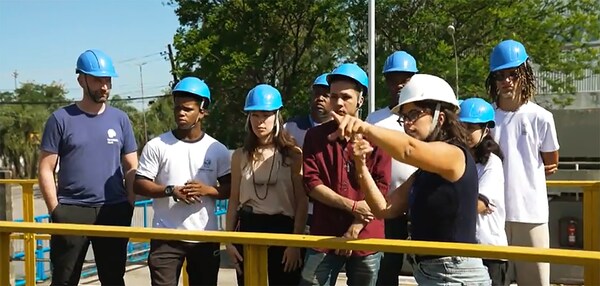
Transcend, a software as a service provider of generative design tools for critical infrastructure based in Princeton, New Jersey, has undertaken an international project training engineering students in Brazil to use its Transcend Design Generator (TDG) software platform to design wastewater infrastructure for at-risk communities.
Transcend partnered with Brazilian nonprofit LuTeS Urbanas, engineering firm Taboa Engenharia and five universities, including the State University of Maringá in Paraná, Universidade Federal do Rio de Janeiro and the University of São Paulo, as part of a new replicable project model funded and supported by nonprofit investor Elemental Excelerator.
Through the collaboration, students mastered the TDG, an online generative design platform that enables capital planners, project developers and engineers to rapidly generate preliminary engineering designs for critical infrastructure. The designs created by the 50 students trained so far through the programme would affect up to 200,000 Brazilians if implemented.
‘Students are hungry to experience real-world applications for their engineering education, particularly when those experiences have a real positive impact on the resilience of their communities,’ said Transcend co-founder and chief customer officer Adam Tank. ‘We saw the need for improved wastewater infrastructure design tools in Brazil, and an opportunity to train a future generation of engineers to use those tools to improve their communities after graduation.’
Communities around the world struggle with ageing sanitation systems and water-treatment facilities that must meet ever-increasing regulatory standards, adopt more sustainable treatment strategies and improve resilience to changing weather patterns and population changes. This is especially pertinent across Brazil, where only 40 per cent of sewage is treated. Brazil’s favela neighbourhoods have some of the highest need for clean, reliable water, yet these communities lack resources to implement solutions. As a result, they suffer from higher rates of disease and mortality.
Transcend received funding from Elemental Excelerator to implement the project with Taboa Engenharia, a Rio-based sustainable engineering firm, and LuTeS, a Rio-based nonprofit organisation that mobilises high school youths for community activities. The collaboration connected local, high-impact organisations, schools and community members from the Rochinha and Maré neighbourhoods in Rio de Janeiro through a bottom–up approach.
‘This is exactly the type of project that we envisioned when we created the Square Partnerships Model, which aims to help tech companies such as Transcend engage directly with community organisations and the people its solutions will impact,’ Elemental Excelerator founder and CEO Dawn Lippert said. ‘After this project, students will graduate with the skills and resources to tackle the challenges that they face in their own communities.’
‘Not only did students learn how to use the most innovative software solutions available in the engineering industry today, they also applied their knowledge to better understand local issues in our favelas and design creative solutions,’ said Leonardo Adler, founder of Taboa Engenharia.
Transcend expects to replicate this model in other regions in need of innovative wastewater infrastructure solutions, and where skilled engineering talent is in highest demand.


